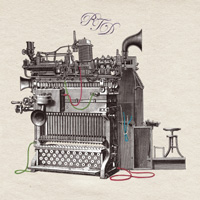Scott Morrow is ALARM’s music editor. Patrick Hajduch is a very important lawyer. Each week they debate the merits of a different album.
 Roll the Dice: s/t LP (Digitalis, 6/8/10 — digital copies available via iTunes)
Roll the Dice: s/t LP (Digitalis, 6/8/10 — digital copies available via iTunes)
Roll the Dice: “The New Black”
[audio:https://alarm-magazine.com/wp-content/uploads/2010/09/Roll_the-Dice_The_New_Black.mp3|titles=Roll the Dice: “The New Black”]
Hajduch: Swedish duo Roll the Dice are not a household name, but you may have heard their work as individuals before. Malcolm Pardon “continously composes for film and television,” while Peder Mannerfelt has long written music as The Subliminal Kid and most recently contributed to Fever Ray‘s album and touring line-up. Together, they make meditative, arpeggiated drone music using only synth and piano.
Morrow: I didn’t care much for that Fever Ray release, although that was more due to Karin Dreijer Andersson‘s breathy squealing (think Björk) and creepy, pitch-shifted vocals (think Antony & The Johnsons). But there were some great moments, like the Eastern-tinged electronics of “Triangle Walk,” and I will say that I appreciated the vibe. The album has grown on me a bit.
Hajduch: The similarities to Fever Ray are few and far between — the meditative pace and timbre of some of the synthesizer lines — but both albums do occupy mostly dark, minor-key territory. “Guadeloupe” is the exception to the rule, a dubby, Mouse on Mars-style ray of sunshine.
The dramatic shift in tone and the rhythmic focus of the track really show off Roll the Dice’s versatility with an extremely limited palette — no percussion, no drum machines. The song gradually builds its two-chord drift by expertly adding and subtracting elements, and it manages to evoke a very dynamic sense of movement despite basically running in place.
Morrow: Yeah, that’s something that stands out to me — how much each track can build up and simmer down despite the instrumental limitations. It’s much more than the standard electronic archetype: start with a beat and bass line, add a synth, and keep layering parts until you feel like changing it.
Hajduch: The thoughtful arcs of the seven tracks do not come off as studio wankery either; they build and decay gradually and naturally, using filter sweeps and slow chord changes. The end result is stunning and singular. Even though 2010 has seen its share of synth-worship ambience (Emeralds, Oneohtrix Point Never), there is a warmth to Roll the Dice that sets it apart.
Morrow: Definitely. It’s not the type of album that I’d usually put on in its entirety, but the album’s constant sense of motion and change allows a track like “Swing” to play without anyone realizing that it’s 10 minutes long. And though there is that unifying minor-key mood, tracks like “Into the Ground” break things up with a foreboding, diminished-key feel. The whole album is brimming with life, making for an outstanding debut.

